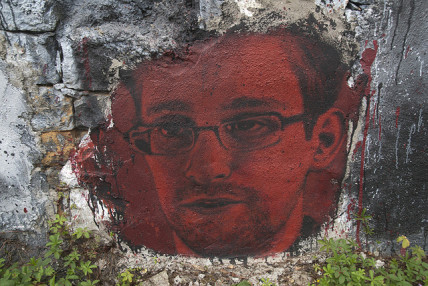
Portrait of Edward Snowden. Photograph by Thierry Ehrmann
At the time of writing, NSA leaker extraordinaire Edward Snowden sits (as far as we know) between immigration control points in Moscow airport.
Snowden’s revelations about the NSA’s signals collection mechanisms and targeting of Americans, non-Americans and foreign governments (including US allies) have provoked a huge response in the global media and by those concerned about privacy rights. Snowden has built on Wikileaks’ adventures in diplomatic transparency, laying bare the highly classified skeleton of the most-powerful intelligence collection mechanisms available and their links to US foreign policy goals.
The impact of Snowden’s actions forces us to question if there has been a dilution in states’ powers to engage in what Sun Tzu called the ‘divine manipulation of the threads’ essential to victory, power and stability. Is this the beginning of a great unravelling of one of the traditional practices underpinning international relations?
The answer is probably no, and lies — metaphorically, at least — in Snowdon’s current predicament, caught in a tussle between three great powers trading on traditional Westphalian concepts of power, sovereignty and diplomacy. Despite the extent to which Snowden’s activities are framed in the drama of the Wikileaks age, it is great-power relations between China, Russia and the United States that will determine Snowden’s future and his impact. Even his multiple bids for asylum rely on fundamental concepts of sovereignty, as do allegations about US influence in the denial of airspace to Bolivian president Morales’ plane on suspicion of its containing Snowden. Information may flow more freely than ever before, but Snowden cannot. His predicament at the moment, and his ultimate impact, are less indicative of a great unravelling of international power politics than of the resilience of this enduring order in the face of technological change.
The timing of Snowden’s revelations on the eve of the inaugural China–US summit suggests an attention to great power politics (which he and his publishers otherwise dismiss), and China’s willingness to use the leaks in probing US attempts to negotiatecybersecurity norms show how easily his actions slot into traditional state power plays. Even so, Beijing could have made far more of the situation than it has, but given its own attitudes to state secrecy Beijing doesn’t necessarily want to host an emerging whistleblower folk hero. Snowden’s flight to and from Hong Kong arguably reveals more about the state of China–Hong Kong–US relations than the leaks themselves do.
Similarly, Snowden’s presence in Russia, and Putin’s refusal to hand him over, simplyexacerbates ongoing US–Russia tensions. It does not change them. In both cases the issue highlights existing bad blood over the exchange of individuals with intelligence value — the cases of Viktor Bout and Chen Guangcheng spring to mind — and offers an opportunity for grandstanding rather than indicating any new rupture in great power politics.
Ultimately, the substance of Snowden’s revelations is simply an outline of the structures of traditional intelligence politics. Outrage is emerging from citizens, not governments, and revelations about either the intent or reach of US intelligence collection mechanisms — or those of its allies — are unlikely to surprise US allies or rivals. At most, the material will affect the United States’ ability to achieve an intelligence-fuelled decision making advantage in negotiations and security policy and heighten the tradecraft of those who fear its impact.
The main effect of Snowden’s leaks lies rather in their impact on US internet policy coherence, by diluting the United States’ moral authority as a beacon of internet freedom. Revelations about the extent to which key US technology companies including Google, Yahoo and Facebook may have cooperated with US surveillance agendas completely undermines any future value the United States might gain from trumpeting these companies as agents of internet freedom for its own public diplomacy agenda, as it did during the Arab Spring. As the People’s Daily puts it, this incident tears off Washington’s ‘sanctimonious mask’.
But the ignominy goes even further. The Snowden revelations emerge just as Washington is attempting to assert its leadership on a range of internet governance issues, including cybersecurity. A recent Council on Foreign Relations task forcenotes that US decision-makers ‘do not have the luxury of pursuing Internet trade, freedom, and security policies in isolation’, and the window for US leadership on the full range of internet issues is now closing. European leaders have already indicatedthat the revelations may affect trans-Atlantic trade negotiations, and the issue feeds emerging US–European divergence on data protection and privacy issues.
Perhaps the most intriguing aspect of Snowden’s adventures lies in the man himself. Despite continuing speculation, Snowden appears to have acted alone. He saw his leaking as a personal responsibility and acted accordingly, in concert with The Guardian. The NSA’s previously most-prominent leakers, William Martin and Bernon Mitchell, also ostensibly acted alone, based on moral convictions. But they relied on state protection and state mouthpieces to make their point when they defected to the USSR in the summer of 1960. In contrast, Snowden has not defected to one side of a great binary in international relations.
Representative of an emerging granularity in international politics, Snowden is an international actor in his own right. Acting alone, he speaks to publics as well as states. Like Assange and Manning — or even Nakoula Basseley Nakoula, the creator of last year’s Innocence of Muslims video — technology gives Snowden as an individual a far-greater role in international politics than previously possible. Unlike Martin and Mitchell, Snowden doesn’t need to align himself with one side of international politics to make his point.
But at present this is a trend with no real impact on the ongoing structures of international relations. As recent events show, Snowden may as yet be doomed by traditional power politics to life in a dreary embassy with a treadmill donated by Julian Assange. The reality is that the transit lounge at Sheremetyevo airport is bounded at either end by the presence of state actors, great power relations, and the enduring conventions of sovereignty. Let’s hope it contains some excellent duty-free bottleshops.
Written by Sarah Logan
Sarah Logan is a PhD candidate at the School of International, Political & Strategic Studies, ANU College of Asia & the Pacific, Australian National University.





1 Comment
Hi,
Where Has the Snowden Affair Left International Diplomacy?
In many ways it has left diplomacy sczophrentic. The events of the re-Routed
Bolivian President’s Plane has united the South American continent where as the events in London of the government’s bugging the Ecuadorian embassy has cost British diplomacy a reputation The distrust of British diplomacy will effect British business in many emerging markets.